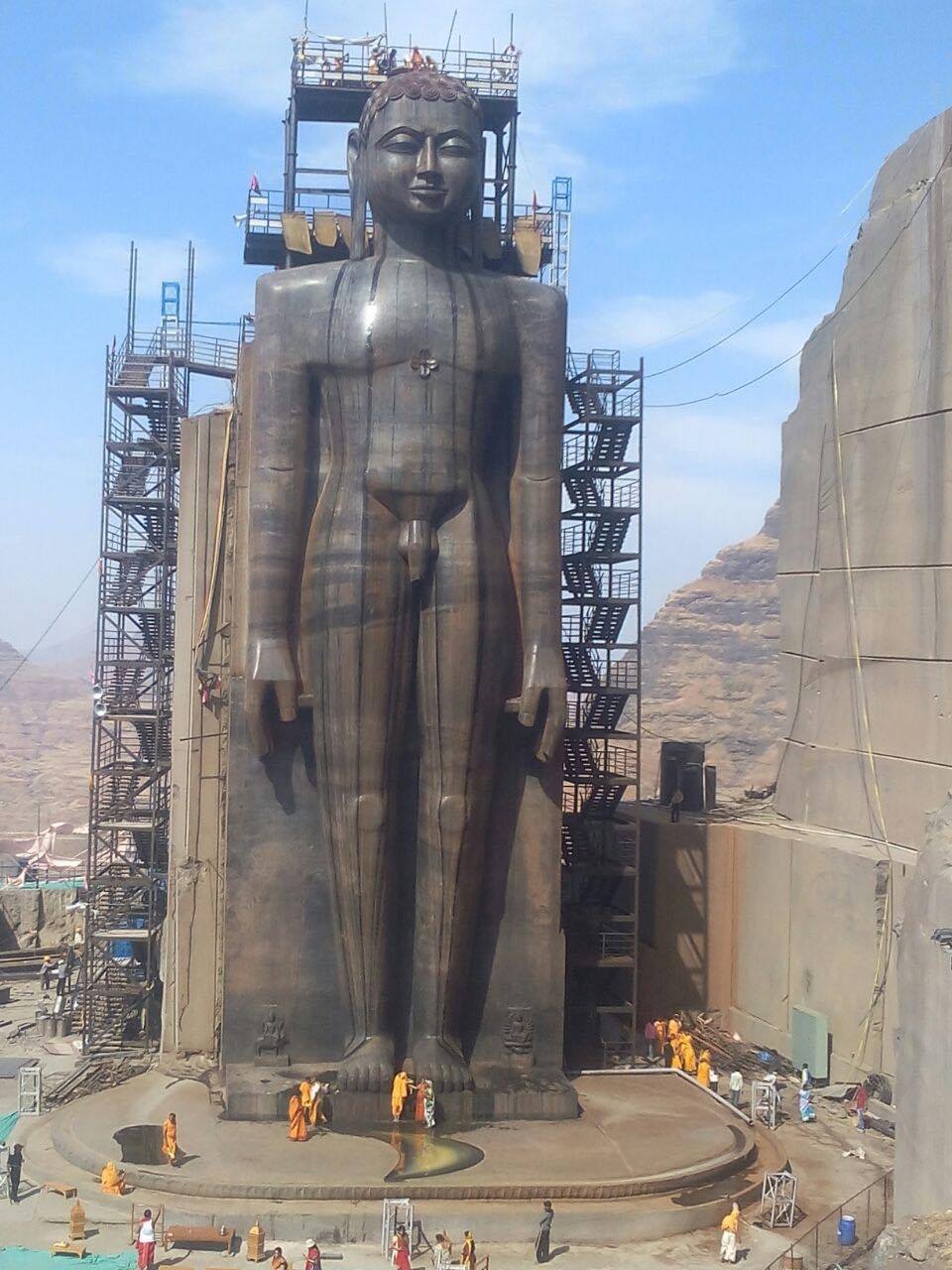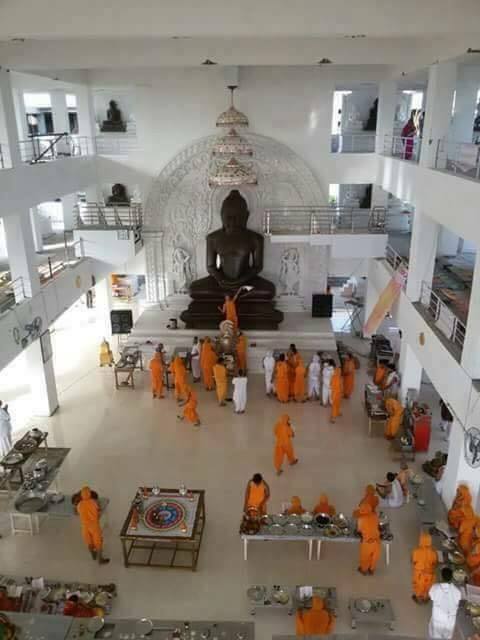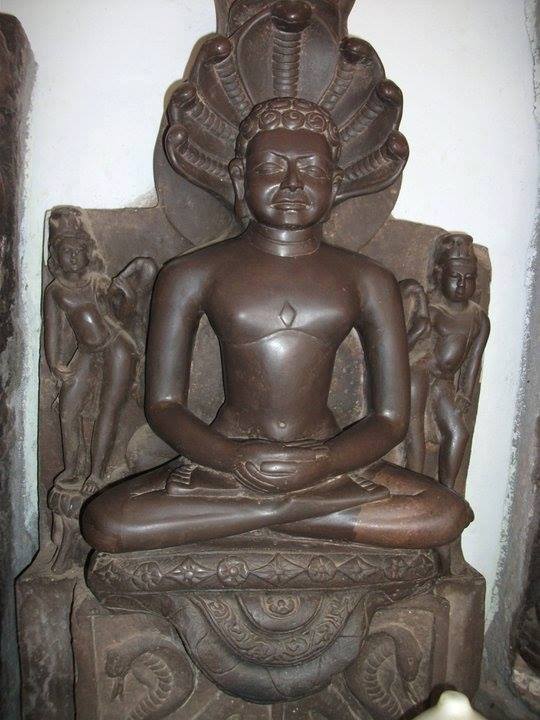Update
मुनि श्री निर्वेग सागर जी द्वारा शंका समाधान Qn- क्या जैन श्रावक तलवार, बंदूक आदि हथियार रख सकता है?? 😳 must read & share
Ans -जैनी श्रावक क्षत्रिय वृत्ति को धारण करने वाले होते हैं। वे संकल्प पूर्वक एक चींटी को भी नहीं मारते किंतु परिवार, धर्म एवं धर्मात्मा की रक्षा के लिए शस्त्र आदि द्वारा किसी का प्रतिघात भी कर सकते हैं। श्रावक विरोधी हिंसा का त्यागी नहीं होता। रामचंद्र जी ने सीता की रक्षा के लिए हजारों सैनिकों का घात किया होगा फिर भी मुनि बन कर मोक्ष को प्राप्त किया। इतिहास में अनेकों जैन राजा एंव सेनापति हुए हैं जोकि शस्त्र विद्या में निपुण थे एवं अनेक युद्धों में विजय प्राप्त कर जैनत्व के गौरव को बढ़ाया। अतः जैनी श्रावक भी शस्त्र आदि रख सकता है रक्षा के उद्देश्य से*।
 Source: © Facebook
Source: © Facebook
Update
Four kinds of Bhavanas (reflection or contemplation)
Bhavana means reflection or contemplation. We are always thinking of something which may be near us or could even be as far away as the other end of the world. This thinking may cause happiness, sorrow, anger, greed, jealousy, or egoism, etc. And depending upon how we react, we attract different types of karmas to our souls. No prudent person would like to attract bad karma and at certain stages any karma at all. But it is not as easy as turning off a switch. So to minimize the bondage of karmas, the Jina have taught us about Bhavanas, which can be easily practiced by the householders.
1) Maitri Bhavana (Thinking of being a Friend)
2) Pramoda Bhavana (Thinking of Appreciation)
3) Karuna Bhavana (Thinking of Compassion)
4) Madhyastha Bhavana (Thinking to stay neutral or uninvolved)
Let us understand how these bhavanas play important roles in our lives, how they can keep us away from bad karmas, and ultimately how they can improve our overall chances to uplift our souls.
1. Maitri Bhavana (Thinking of the Friendship): Lord Mahävira said, "We must be friend to all living beings." The feeling of friendship brings love and respect to others. It also initiates a feeling of brotherhood among all and in turn leaves no room for the harm, deceit or quarrelsomeness with anybody. If we contemplate on Maitri Bhavana (Thinking of the Friendship), our thoughts, words, and actions will not be harsh, and we will not hurt anybody. On the contrary, we will support and protect everybody. Friendship will lead us to be tolerant, forgiving, and caring for one another. Therefore, if we develop a friendship with all living beings, we will avoid bad karma.
2. Pramoda Bhavana (Thinking of the Appreciation): In this Bhavana, we admire the success of others like our friends, spiritual leaders, and the Arihants (Who conquered the Karmas) etc. One of the most destructive forces in our lives is jealousy. However, friendship combined with the admiration, destroys jealousy. As jealousy subsides, negative impulses are turned into positive ones, and in due time, we will be at peace.
3. Karuna Bhavana (Thinking of the Compassion): Instead of succeeding, many of our friends may be getting into trouble for the things that can be avoided and should not be done. Even some of those who are successful may be accumulating vices such as greed and ego. They are not on the right path. They may be weak, helpless, and in distress. At a time like this, we should contemplate on the Karuna Bhavana and show compassion for them instead of disgust or hate. We should show them the right path with the patience, tolerance, and forgiveness and offer them the needed support. This way we can avoid accumulating bad karma for us as well as for them.
4. Madhyastha Bhavana (Think of staying neutral or uninvolved): The life appears to be nothing but involvement. Sometimes the situation works out favourably and sometimes it does not. So instead of getting disappointed, angry, or more involved, we should contemplate on Madhyastha Bhavana which leads to the feeling that "I did my best to resolve the situation." This leads our mind to decide that if someone does not want to understand, then leave that person alone without getting further involved. We should simply hope that one of these days, that person may understand things and change. By observing Madhyastha Bhavana, we remain in equanimity, instead of provoking turmoil in our minds. When our mind stays neutral and uninvolved, then the karma stays away.
In short, we can avoid the influx of bad karmas and live peacefully in this worldly life by developing friendships with all living beings, admiring their success, holding their hands when they are in the distress, and leaving them alone at the times when they do not understand what is right or wrong. So until it becomes the natural way of life to observe the above Four kinds of Bhavanas, one should contemplate on them as many times as needed. If there is a goal, then there is an achievement!
 Source: © Facebook
Source: © Facebook
News in Hindi
Liberation /Salvation (MOKSA) worthy write-up
On account of the removal of the causes of bondage as also on account of the dissociation of the bound karmas, there takes place the total and absolute dissociation of all karmas. This is liberation. In liberation the soul is lotally and absolutely free from all karm& and consequently established in its pure and pristine state. To move upward on the total and absolute irmoval of all the karmas is the nature of soul. We have already given an instance of a gourd to explain this phenomenon. Moving upward when Ihe soul reaches the end of the universe, it stops there and rests there. It cannot move further upward because beyond the upper limit of the universe there is no medium of motion, an assisting cause of motion, there. Nor can it move back downward, because it has no weight, nor sideways, because it is devoid of any urge generated by karmas.
In the state of liberation the soul is absolutely free from all karmas, the hampering and defiling adjuncts. And consequently it does not have body, sense-organs and mind altogether. So, bliss or happiness that the liberated experiences is riot conditioned and perverted by them. It is eternal, infinite and pure. It is indescribable and matchless. All sensual pleasures taken together of all the three worlds are nothing before the highest natural bliss of the liberated. Some have doubt in their mind: How can there be any pleasure or happiness in the state of liberation because in that state there is total absence of all the means of sensual pleasure? In liberation, there are no gardens, no women, no vehicles, no sweet dishes, etc. But how can we forget that all the miseries a soul experiences in the world are due to its desire for sensual pleasures? Afflictions due to desire for sensual pleasures are the only afflictions that we. find in the world. The reason why we enjoy sweet and delicious dishes is that we are afflicted with hunger. When one's belly is full, one does not like even the nectar-sweet food. We do not like to wear in scorching heat of the summer sun those very clothes which we like to wear in winter to remove sufferings due to cold. One who has sat for long, wishes to walk. And one who is tired of walking, wishes to sit and rest. Enjoyment of sensual pleasures at the end'appears as unfavourable as it has appeared favourable in the beginning. How queer are the events in this world? Do I he objects that we regard as means of happiness produce any positive happiness besides some relief? When a suppurated boil bursts we experience relief. But that is no real positive happiness. It is merely subsidence of pain. The pleasure we experience in sensual enjoyment is nothing but subsidence of pain and distress.
1. And how long does this sensual pleasure continue? It is perishable. It is momentary. Within a moment it disappears and again a whirl-wind of miseries, afflictions and distresses rises. And that slight sensual pleasure is not a positive state of happiness, but simply a negative condition of the absence of misery. Again, it is always mixed with grief and sorrow. Are there in this world only a few distresses and agonies due to attachment and aversion? Are there only a few griefs caused by desires arid anger? Are there only a few attacks of diseases and sorrows? Are all these situations pleasant? Is the degree of distress and dissatisfaction not infinite times more than that of peace and satisfaction?
One who is suffering from eczema, experiences pleasure in scratching skin affected with it. Others do not have any desire to scratch skin, nor do they experience pleasure in doing so. Similarly, those who are afflicted with desires arising from delusion or nescience find pleasure in activities inspired by it. But how can others (i.e., those free from delusion, nescience and hence from attachment, or the liberated ones) find pleasure in such activities? Sensual pleasure experienced in the enjoyment of worldly objects is like the pleasure experienced in scratching skin affected with eczema. The liberated souls, who are completely cured of the disease of delusion, always remain blissfully engrossed in their pure natural state. Such bliss as is there in the absolutely pure state of soul (i.e., in liberation) is ultimately real, perfectly pure and completely unmixed with sorrow. The Indian philosophers have given to such supreme souls as are absolutely pure, supremely blissful and perfectly luminous (i.e., omniscient) various names, viz., Suddha (the Pure), Buddha (the Enlightened), Siddha (the Perfected), Niranjana (the Unstained), etc
Liberation is attained through human body only. Heavenly gods are by nature lacking in restraint. So, it is not possible for them to attain the supreme state of liberation directly from their state of godhood. All worldly souls are divided into two, viz., the bhavyas and the abhavyas. The bhavyas are those who are capable of attaining liberation, whereas the abhavyas are those who are not capable of attaining liberation.
 Source: © Facebook
Source: © Facebook
